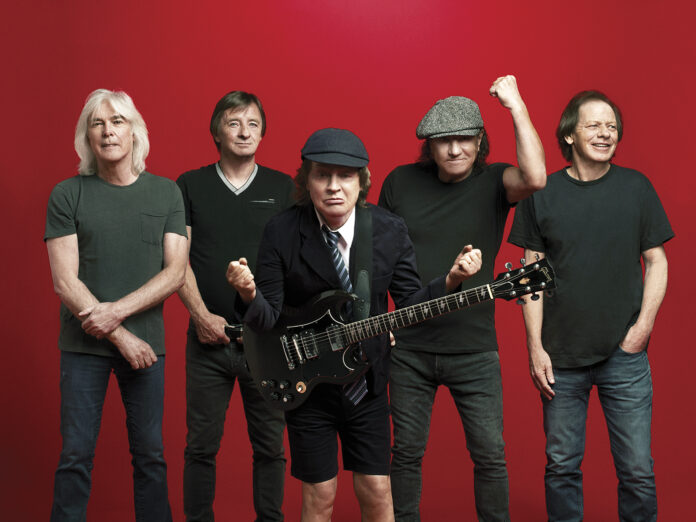Where would we be without AC/DC? Their libidinous bar-room blues might seem – at the very least – anachronistic in sanitised, gender-neutral 2024, but the thirst for their primal boogie remains unquenchable: 2020’s Power Up debuted at number one in 21 countries.
Where would we be without AC/DC? Their libidinous bar-room blues might seem – at the very least – anachronistic in sanitised, gender-neutral 2024, but the thirst for their primal boogie remains unquenchable: 2020’s Power Up debuted at number one in 21 countries.
ORDER YOUR COPY OF THE NEW UNCUT, FEATURING AN EXCLUSIVE DAVID GILMOUR INTERVIEW AND A FREE CAN CD!
The touring lineup for their latest stadium jaunt may boast only the indefatigable Angus – 68 years, erm, Young – from the lineup for their first-ever gig at Sydney’s Chequers nightclub on December 31, 1973, but 200 million album sales later, their gonzo appeal is if anything stronger than ever – a red-blooded, two-fingered raspberry in the face of an unblinking AI.
Accordingly, while not all of these gold vinyl reissues can be described as essential – only completists, you imagine, will be rushing to revisit Who Made Who, the soundtrack for Stephen King’s flop 1986 horror movie Maximum Overdrive – as a whole they provide a fascinating insight into the working practices of a band whose gristle-free formula and ego-free approach have seen them negotiate everything from punk to pandemics en route to global domination.
Many might scoff at a 50-year back catalogue where continual reworkings of the same three-chord trick come allied to lyrics which, as Angus once described, rarely move beyond the (un)holy trinity of “cars, girls and party time”. Yet, much like the Stones, by continually honing this base metal formula, AC/DC have achieved sonic gold: a sound uniquely their own.
The earliest experiments are invariably the most thrilling. High Voltage is the aural equivalent of being wired into the mains, the band’s tough-as-tungsten mindset spelt out in defiant opener “It’s A Long Way To The Top (If You Wanna Rock ’n’ Roll)”, Bon Scott bawling, “Gettin’ old/Gettin’ grey/Gettin’ ripped off/Underpaid” amid the howl of screaming bagpipes.
If the following year’s Dirty Deeds Done Dirt Cheap — the title an homage to a character in kids’ cartoon show Beany And Cecil — practically invents Beavis And Butt-Head, it’s 1978’s Powerage which best exemplifies their less-is-more approach. The purist’s ’DC album of choice, and tellingly Keith Richards’ favourite, it’s stripped to the bone sonically, Cliff Williams’ pump-action basslines the springboard for a tripwire-taut 40 minutes featuring some of their funkiest, and grimiest, grooves. If the hardwire-riffing is every bit as thrilling as the Chuck Berry records which inspired the Young brothers in the first place, Scott’s low-life snapshots of the drug-addicted and debt-ridden are as spiky as anything by the Sex Pistols or The Stranglers.
“Stirred the coffee with the same spoon,” laments the singer with a world-weary shrug on “Gone Shootin’”, the tale of a hopelessly drug-addicted girlfriend, while a brooding “Sin City” finds the singer using Las Vegas as a metaphor for the miserable lot of the working man in a world where the loaded dice of life are always rigged against him, dreams of “Lamborghinis, caviar, dry martinis” eternally out of reach.
It’s also on Powerage where the difference between ’DC and (most of) their late ’70s peers is most stark, their musical know-how never more evident than on “Riff Raff”. The song’s lyrical message (“Ain’t done nothin’ wrong/I’m just having fun”) might mirror, say, Jimmy Pursey of Sham 69’s happy-go-lucky worldview, but musically it’s in a different league, Scott’s sandpaper drawl set against an electrifying, five-minute fusion of prog-rock dexterity and punk fury, Angus’ molten solos a reminder that a scorched-earth policy always works best when you’re wearing devil’s horns.
These musical chops were, of course, utilised to their full potential on 1979’s imperious Highway To Hell. Scott would be dead just eight months after its release (official cause: acute alcohol poisoning after a visit to Camden club The Music Machine, now Koko), and 45 years on, its cheerful celebration of deviance, immorality and plain bad behaviour sounds as exhilarating as ever thanks to Mutt Lange’s super-slick production.
For most bands, the loss of a charismatic frontman invariably sounds the death-knell for their career. But by doubling down on their core values and recruiting affable former Geordie frontman Brian Johnson, the ultimate team player, for 1980’s epochal Back In Black, ’DC defied the odds once more, channelling their grief into the biggest-selling hard-rock album of all time.
Recorded sightings of this diabolic alchemy at full power have been all too rare since the brutalist bombast of 1981’s For Those About To Rock (We Salute You) – their third, and last, collaboration with Lange – and it doesn’t feel coincidental that these reissues skip over the creative trough beginning with 1983’s self-produced Flick Of The Switch and including 1985’s Fly On The Wall and 1988’s Blow Up Your Video.
It was by getting back to basics and allowing über-producer Brice Fairburn to helm 1990’s The Razor’s Edge that ’DC struck gold once more, the numbskull nirvana of “Thunderstruck” re-establishing them as global big-hitters, as illustrated on the following year’s Live double album, recorded at shows in the UK, Canada and Russia.
Rock’n’roll damnation? Far from it. Almost 25 years on, the same songs remain the bedrock of their live performances, and these albums the gold standard for all those who dare follow them.



